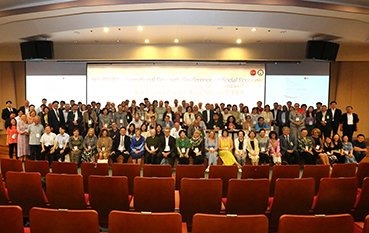From July 4 to 6, the 9th CIRIEC International Research Conference on Social Economy was held in Seoul, South Korea. Organized by Sungkonghoe University, with the collaboration of CIRIEC-International, the Conference has had the participation of 300 people from 41 countries, who have presented 130 communications on the most current issues of the social and cooperative economy from a global perspective to the local or regional. Professor Sang-Youn Lee, from Sungkonghoe University, has directed the congress, along with the president of the CIRIEC-International Social Economy Scientific Commission, Marie J. Bouchard (CIRIEC-Canada).
It is the first time, in its nine editions, that the CIRIEC-International Research Conference on Social Economy has been held in Asia. Other participants were Koreans Ilcheong Yi, senior research coordinator of the Alternative Economies for Transformation program of the United Nations Research Institute for Social Development (UNRISD); and Hyunsik Eum, research director of the International Cooperative Alliance (ICA), together with Simel Esim, director of the ILO Cooperatives Unit, which has promoted, together with CIRIEC and other organizations, the first global and official definition of Social Economy.
Precisely, the recent resolutions of the ILO, the UN, and also the OECD, recognizing the performance of the social economy in sustainable development, decent work or the reduction of inequalities, have been some of the topics of celebration and analysis in the Conference.
The first day of the Conference, on July 4, was held in the assembly hall of the Korean National Assembly Bookstore. The interventions of Rie Vejs-Kjeldgaard, director of the Department of Sustainable Companies, Productivity and Just Transition of the ILO, who precisely valued the achievement of a global definition of social economy, a definition that was quickly adopted by the UN in its Resolution A/ 77/L.60; and the lecture by Katherine Gibson, professor at Western Sidney University and co-founder of the Community Economies Collective. From her Anglo-Saxon point of view, Gibson highlighted the role that the social economy can play in building ethical ways of life, in the face of today’s enormous challenges, including inequality and poverty, or the degradation of the planet.
22 parallel workshops
Along with the plenary sessions, the Conference has scheduled a total of 22 parallel workshops to present communications, on topics such as democratic governance, ecosocial transition, partnerships between the social economy and the public economy, legal frameworks, digitization, gender and equality.
The importance of statistics
The second and third days of the Conference were held at the facilities of Sungkonghoe University. On the second day, the Congress dedicated a round table to the problem of social economy statistics, with the participation of Simel Esim and Hyunsik Eum, together with Gianluca Salvatori (Euricse) and representatives of Turkey, Vietnam, Tanzania and Costa Rica. Once again, the efforts being made by different countries to collect statistics on the Social Economy were valued, and the need for the creation of robust, homogeneous and internationally comparable statistics was formulated, which allows the different agents to be shown the main magnitudes and impact of the sector.
Cooperatives and Social Economy in Korea
The Conference dedicated a couple of plenary sessions also to the Korean reality, in which cooperative legislation and the future of the sector in that country were analyzed. In an economy with a huge role for technology and innovation, with 4 large groups that lead exports, and with Seoul declared the world capital of Startups, the social economy and cooperatives are making their way as an alternative form of entrepreneurship. Currently, cooperatives are the main business figure of the social economy, numbering over 10,000 to employ 70,000 workers in South Korea.
In this context, Sungkonghoe University, host of the Congress, was the first Korean university to offer a postgraduate degree in Cooperative Management, in 2010, a program to which an MBA on the same subject was added in 2016.
The Social Transformation Capacities of the Social Economy
The Conference closed this Thursday, July 6, with a speech by Ilcheong Yi (UNRISD), in which he explained how he was definitely convinced of the social transformation capabilities of the social economy and cooperatives. It was at the Academy of Social and Solidarity Economy (ILO) in 2017, which was also held in Seoul. Since then, UNRISD has initiated different major projects on the social and solidarity economy, and its relationship with the SDGs, which it has embodied in the UNTFSSE ‘Knowledge Hub’ on the Social and Solidarity Economy and SDGs, which it took over in 2018, or in the Encyclopedia of the Social Economy, with 57 entries written by the most experts in the field, each one on key aspects of the social economy.
The Conference concluded with the delivery of the Awards for the best communications presented on Social Economy and SDGs, whose winners were Celia Carlier & Aymar Nyenyezi Bisoka (University of Mons, Belgium), for her work ‘Manufacturing’ resilience through cooperatives in the ‘Global South’: the case of post-genocide Rwanda; Sara Landry-Pellerin & Marie J. Bouchard (University of Quebec in Montreal), for her communication ‘Paradoxical tensions in the implementation of a social innovation: the case of the Sunny Spoon pooling’s project’, and Kwangjin Huh & Sangsun Park (Sungkonghoe University), for her work ‘A Study on the Quality Dimension of Consumer Cooperatives in Korea’.
The next CIRIEC-International Research Conference on Social Economy, the 10th, will be in 2025, from October 27 to 29 in Bordeaux, France.







